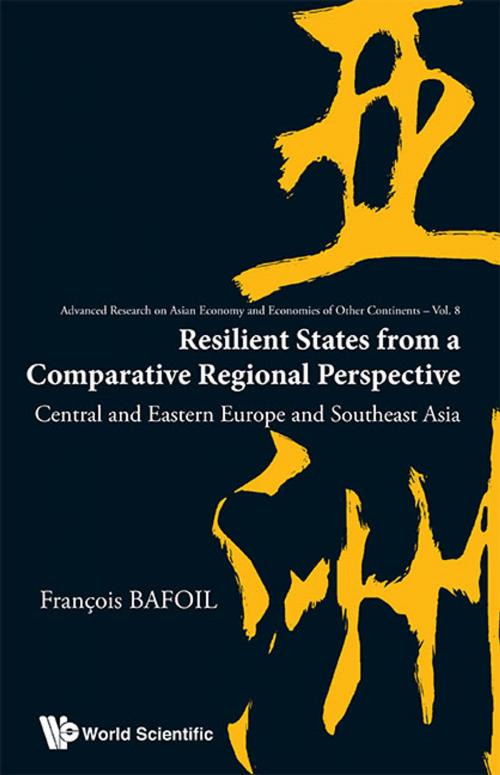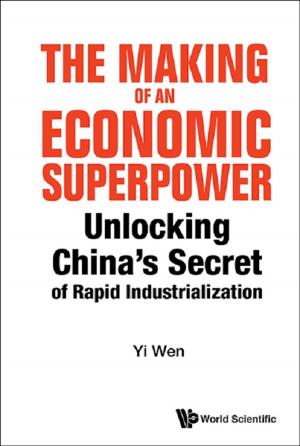Resilient States from a Comparative Regional Perspective
Central and Eastern Europe and Southeast Asia
Business & Finance, Economics, International Economics, Economic Development| Author: | François Bafoil | ISBN: | 9789814417488 |
| Publisher: | World Scientific Publishing Company | Publication: | January 28, 2013 |
| Imprint: | WSPC | Language: | English |
| Author: | François Bafoil |
| ISBN: | 9789814417488 |
| Publisher: | World Scientific Publishing Company |
| Publication: | January 28, 2013 |
| Imprint: | WSPC |
| Language: | English |
Organizations such as ASEAN and EU were formed to promote economic growth, social progress and cultural development among their members. This book provides a comprehensive overview of the transformation which the newest members of ASEAN (Cambodia, Laos, Myanmar and Laos) and the newest members of EU (ten new Members from Baltic, Central and Eastern Balkan regions) have experienced during the last two decades (1990–2010). It throws light on the different social, economic and political causes which support these historical changes.
Emerging markets such as the Mekong region and Central Europe where new forms of capitalism are flourishing have been captured in this book. Their policies in privatization, regionalization, industrial growth that support a new and deregulated form of capitalism have been mentioned in detail. The author stresses upon the capacity and strengths of these two hitherto “weak states” to face worldwide and regional challenges.
Contents:
-
Introduction — The Destruction of Historical States:
- History and Geography Matter — But for What Kind of Legacies?
- Defining a State in Transition
- Conclusion — Clusters of Modernized States in Southeast Asia and CEE
-
Introduction — Coherence of the Public Policies: Privatization, Regionalization, Industrial Relations:
- Transforming Economies: From Planned Economies to More Legal Rules or Towards Nomenklatura Capitalism?
- Transforming Polities: States, Regions and Administration
- Managing Firms by Flexibility: The Lack of Industrial Relations
- Conclusion
-
Introduction — EU and ASEAN Enlarged and Globalized Regions:
- The EU and ASEAN: Cohesion Policy and Export-Oriented Agreements
- State, Sub-State Designs and Cross-Border Cooperation
- EU and ASEAN Enlargement: Enlarged Globalization Dynamics
- Conclusion
-
General Conclusions: Types of Capitalism in Central Europe and in Southeast Asia
Readership: Undergraduates and postgraduates in economics, political science and public policy; international agencies; government departments and think-tank bodies; policy makers; academic researchers.
Key Features:
- Shows the transformation the newest members of ASEAN (Cambodia, Laos, Myanmar and Laos) and the newest members of EU (ten new Members from Baltic, Central and Eastern Balkan regions) have experienced during the last two decades (1990–2010)
- Uses a common theoretical framework based on the approach of “strong states vs weak states”
- Emerging markets such as the Mekong region and Central Europe where new forms of capitalism are flourishing have been captured
Organizations such as ASEAN and EU were formed to promote economic growth, social progress and cultural development among their members. This book provides a comprehensive overview of the transformation which the newest members of ASEAN (Cambodia, Laos, Myanmar and Laos) and the newest members of EU (ten new Members from Baltic, Central and Eastern Balkan regions) have experienced during the last two decades (1990–2010). It throws light on the different social, economic and political causes which support these historical changes.
Emerging markets such as the Mekong region and Central Europe where new forms of capitalism are flourishing have been captured in this book. Their policies in privatization, regionalization, industrial growth that support a new and deregulated form of capitalism have been mentioned in detail. The author stresses upon the capacity and strengths of these two hitherto “weak states” to face worldwide and regional challenges.
Contents:
-
Introduction — The Destruction of Historical States:
- History and Geography Matter — But for What Kind of Legacies?
- Defining a State in Transition
- Conclusion — Clusters of Modernized States in Southeast Asia and CEE
-
Introduction — Coherence of the Public Policies: Privatization, Regionalization, Industrial Relations:
- Transforming Economies: From Planned Economies to More Legal Rules or Towards Nomenklatura Capitalism?
- Transforming Polities: States, Regions and Administration
- Managing Firms by Flexibility: The Lack of Industrial Relations
- Conclusion
-
Introduction — EU and ASEAN Enlarged and Globalized Regions:
- The EU and ASEAN: Cohesion Policy and Export-Oriented Agreements
- State, Sub-State Designs and Cross-Border Cooperation
- EU and ASEAN Enlargement: Enlarged Globalization Dynamics
- Conclusion
-
General Conclusions: Types of Capitalism in Central Europe and in Southeast Asia
Readership: Undergraduates and postgraduates in economics, political science and public policy; international agencies; government departments and think-tank bodies; policy makers; academic researchers.
Key Features:
- Shows the transformation the newest members of ASEAN (Cambodia, Laos, Myanmar and Laos) and the newest members of EU (ten new Members from Baltic, Central and Eastern Balkan regions) have experienced during the last two decades (1990–2010)
- Uses a common theoretical framework based on the approach of “strong states vs weak states”
- Emerging markets such as the Mekong region and Central Europe where new forms of capitalism are flourishing have been captured















